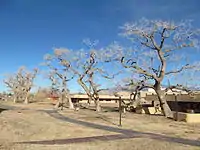Southwestern Indian Polytechnic Institute
Southwestern Indian Polytechnic Institute (SIPI) is a public tribal land-grant community college in Albuquerque, New Mexico. It is federally operated[2] by the Bureau of Indian Affairs and funded through the Bureau of Indian Education, an agency within the U. S. Department of the Interior. More than 120 different Indian Tribes are represented in SIPI's student body.[3]
 Southwestern Indian Polytechnic Institute | |
| Type | Public tribal land-grant community college |
|---|---|
| Established | 1971 |
Parent institution | Bureau of Indian Affairs |
Academic affiliations | Space-grant |
| President | Dr. Sherry Allison |
| Undergraduates | 488[1] |
| Location | , , United States |
| Campus | urban/suburban reserve |
| Website | www |
History
The Southwestern Indian Polytechnic Institute was conceived by the All Indian Pueblo Council, who envisioned a post-secondary school that could serve the Native American Community. Collective efforts with tribal leaders, public officials, and interested citizens, resulted in the school's founding in 1971; dedication ceremonies were held on August 21, 1971, and September 16, 1971, was the first day of classes. It operated initially on an "open-entry, open-exit system" of individualized training.
In 1974, SIPI was awarded a citation for Excellence of Service. By 1975, SIPI was accredited at the Certificate Level by the North Central Association of Colleges and Schools.[4]
In 1994, the college was designated a land-grant college alongside 31 other tribal colleges.[5]
Campus
SIPI is located on approximately 164 acres in northwest Albuquerque, New Mexico. SIPI is located in the center of New Mexico’s agricultural and high-tech corridors (Los Alamos and Sandia National Laboratories, and Intel Corporation), major universities and the largest technical force within a 500-mile radius. SIPI's state-of the-art Science and Technology Center includes 12 research and teaching laboratories, 10 classrooms, two distance learning rooms, a 500-seat auditorium, faculty offices and conference rooms.[6]
Partnerships
SIPI has agreements with the University of New Mexico, New Mexico State University, and New Mexico Highlands University to ensure better recruitment, transfer, and retention rates for Native Americans so that students may easily transfer to four-year programs and graduate work. The college has also established agreements with regional public institutions outside of New Mexico.[7]
SIPI is a member of the American Indian Higher Education Consortium (AIHEC), which is a community of tribally and federally chartered institutions working to strengthen tribal nations. SIPI was created to serve higher education needs of American Indians. SIPI generally serves geographically isolated populations who do not have ready access to higher education.[8]
The institute lost its accreditation from the Higher Learning Commission in July 2010.[9] On March 12, 2014 SIPI was awarded "Initial Accreditation" by the Higher Learning Commission[10] and is once again accredited by the agency.
See also
References
- Institution of Education Sciences
- "Colleges and Universities Archived 2015-05-08 at the Wayback Machine." Bureau of Indian Affairs. Retrieved on June 16, 2015.
- American Indian Higher Education Consortium Archived 2012-06-14 at the Wayback Machine
- "Our History". Southwestern Indian Polytechnic Institute. Archived from the original on 26 June 2012. Retrieved 20 August 2012.
- "NIFA 1994s The First 20 Years of the 1994 Land-Grant Institutions Standing on Tradition, Embracing the Future" (PDF). National Institute of Food and Agriculture. September 25, 2015. Retrieved December 20, 2020.
- American Indian Higher Education Consortium Archived 2012-06-14 at the Wayback Machine
- American Indian Higher Education Consortium Archived 2012-06-14 at the Wayback Machine
- American Indian Higher Education Consortium Archived 2012-06-14 at the Wayback Machine
- Schoellkopf, Andrea (15 July 2010). "SIPI Asks Colleges To Honor Credits". Albuquerque Journal. Retrieved 20 August 2012.
- "Archived copy" (PDF). Archived from the original (PDF) on 2015-02-05. Retrieved 2015-02-05.CS1 maint: archived copy as title (link)
| Wikimedia Commons has media related to Southwestern Indian Polytechnic Institute. |